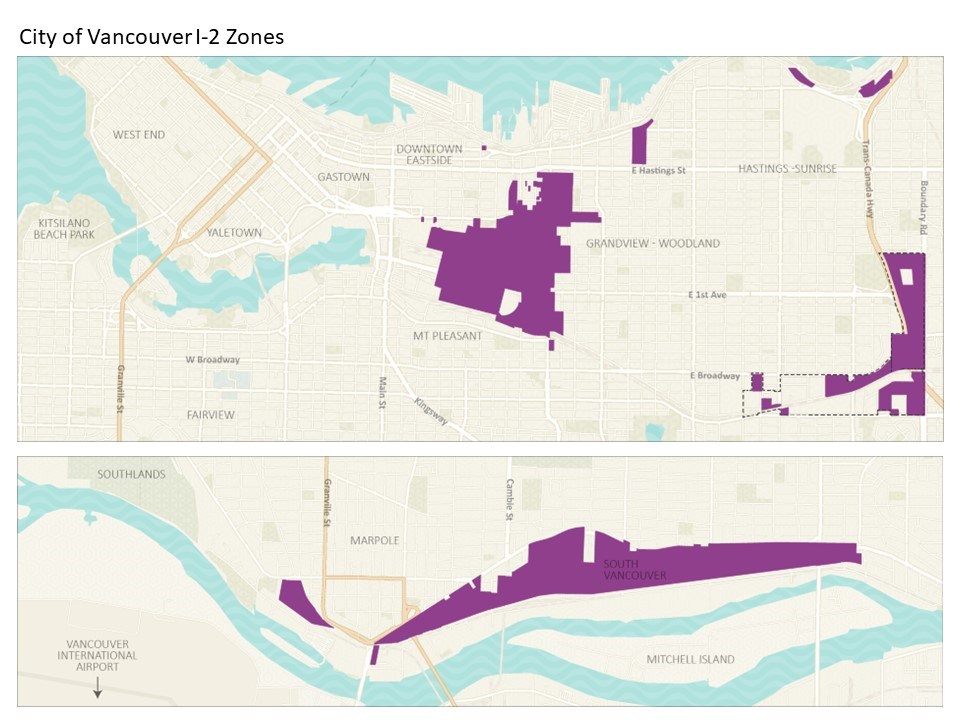
Certain medical, professional business tenants able to use upper-level industrial spaces
Changes to Vancouver zoning bylaws will allow for wider and more creative use of coveted industrial land.
The city’s updated I-2 zoning regulations aim to address maximize industrial land use amid low industrial vacancy by allowing certain kinds of tenants to occupy the upper floors of light and medium industrial buildings.
“The zoning amendments serve to modernize the types of activities that are permitted on the upper floors of industrial buildings, making it easier for developers to bring forward more projects and increase industrial supply overall,” said the City of Vancouver in an email.
The vacancy rate for industrial land in Metro Vancouver reached 1.4 per cent, as of the fourth quarter of 2023. The availability rate sat at three per cent for this same quarter—the highest it’s been since 2017.
The average asking rent for industrial land in Metro Vancouver was $21.44 per square foot in the fourth quarter of last year, achieving an annual growth of 1.6 per cent, despite declining for the third consecutive quarter, according to Colliers.
“We used to have tons of calls from lawyers, accountants and whatnot, looking for small private offices that are 600 square feet to 1,000 square feet for their business and they just couldn’t operate within [the previous] zoning,” said Matt Smith, senior vice-president of industrial with Colliers Canada in Vancouver.
The zoning update will allow office tenants in medical, dental, legal, accounting, real estate, insurance and other industries to utilize industrial land, according to the firm.
The new zoning will apply to all I-2 zones in Vancouver, according to the city.
City council has instructed city staff to report back on the scope and resources needed for future planning work in the South Vancouver Industrial Area, in addition to finding out what is needed to kickstart a review of zoning regulations in the Railtown are.
“The office market has been stronger outside of the downtown core,” said Smith. “They’re looking for these suburban office spaces, which is typically where I-2 is, up and down Clark Drive and parts of South Vancouver. So, this opened up more possibilities.”
Office vacancy in these areas rose to 7.7 per cent in Q4 2023. This is lower than the Metro Vancouver office vacancy rate of 8.6 per cent, and downtown Vancouver’s vacancy rate of 11.8 per cent, according to Colliers.
Marine Landing by developer Wesbild Holdings Ltd. is an example of an office-industrial project that is seeing more interest as a result of the zoning changes.
The project is set to add 242 light industrial and office strata units for a total of 340,000 square feet of job space, in addition to an outdoor rooftop patio with a barbeque area, a dog run and a fitness centre.
“Under the previous zoning rules, roughly 80 businesses had expressed interest in buying office units at the Marine Landing but were not able to operate in the buildings. The changes have already prompted several sales including to a chiropractic clinic, physiotherapy clinic, law firm, and several other office users,” said Colliers in a Feb. 29 report.
Another example of the type of projects the city could see more of is Conwest Developments’ Ironworks buildings in East Vancouver’s Port Town neighbourhood.
Completed in 2019, the project includes two buildings with 140,000 square feet of light industrial space and 70,000 square feet of office space.
“We built Ironworks and [Gil Kelly] was a huge fan of that, he saw the potential in the project and how it was going to meet this unsatisfied demand for industrial in the future,” said Ben Taddei, partner and COO at Conwest, referencing the former Vancouver chief planner.
“We don’t know what uses are going to go in these spaces 15, 20 and 30 years from now. So, let’s not worry about that. Let’s do two things: Let’s design really functional spaces that can adapt over time … and let’s have the equivalent in zoning.”
Ironworks features a rooftop patio, private decks with mountain views as well as bike storage and 100,000 square feet of parking space.
Conwest is also working on its Riverworks project in South Vancouver, which is set to feature strata industrial and commercial space. This is in addition to amenities such as an outdoor kitchen and barbeque, surface parking with electric vehicle outlets and a walking path along the river.
“In general, developers are always looking at what they can do to set their project apart, whether it’s a super high-end lobby or entryways, that replicate downtown office buildings,” said Smith.



